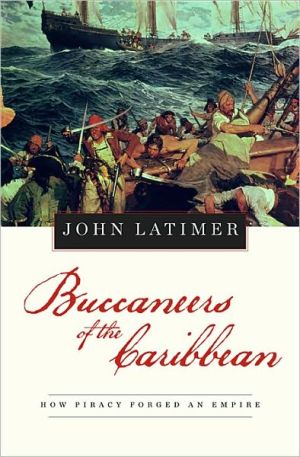Buccaneers of the Caribbean: How Piracy Forged an Empire
During the seventeenth century, sea raiders known as buccaneers controlled the Caribbean. Buccaneers were not pirates but privateers, licensed to attack the Spanish by the governments of England, France, and Holland. Jon Latimer charts the exploits of these men who followed few rules as they forged new empires.\ Lacking effective naval power, the English, French, and Dutch developed privateering as the means of protecting their young New World colonies. They developed a form of semi-legal...
Search in google:
During the seventeenth century, sea raiders known as buccaneers controlled the Caribbean. Buccaneers were not pirates but privateers, licensed to attack the Spanish by the governments of England, France, and Holland. Jon Latimer charts the exploits of these men who followed few rules as they forged new empires.Lacking effective naval power, the English, French, and Dutch developed privateering as the means of protecting their young New World colonies. They developed a form of semi-legal private warfare, often carried out regardless of political developments on the other side of the Atlantic, but usually with tacit approval from London, Paris, and Amsterdam. Drawing on letters, diaries, and memoirs of such figures as William Dampier, Sieur Raveneau de Lussan, Alexander Oliver Exquemelin, and Basil Ringrose, Jon Latimer portrays a world of madcap adventurers, daredevil seafarers, and dangerous rogues. Piet Hein of the Dutch West India Company captured, off the coast of Cuba, the Spanish treasure fleet, laden with American silver, and funded the Dutch for eight months in their fight against Spain. The switch from tobacco to sugar transformed the Caribbean, and everyone scrambled for a quick profit in the slave trade. Oliver Cromwell’s ludicrous Western Design—a grand scheme to conquer Central America—fizzled spectacularly, while the surprising prosperity of Jamaica set England solidly on the road to empire. The infamous Henry Morgan conducted a dramatic raid through the tropical jungle of Panama that ended in the burning of Panama City.From the crash of gunfire to the billowing sail on the horizon, Latimer brilliantly evokes the dramatic age of the buccaneers. Publishers Weekly In the 17th century the legalities of privateering were ever in flux. A pirate one day might receive a royal commission the next, becoming a "privateer" fighting for the crown; it is these privateers-or in England, buccaneers-that are Latimer's focus. Spain was the juggernaut of the era, but swashbuckling seafarers (as well as continental wars and poor colonial management) contributed to the slow diminishment of its power. Recounted here are numerous tales of sieges and nautical battles, daring escapes and surprising disasters, vicious raids, piratical infighting, violent religious tensions, and the political jockeying of European powers struggling for dominance in the New World. Latimer (Alamein) employs clear, spare prose with an eye for the potent detail to accentuate a story. Readers new to the period may struggle to keep track of the players in this detailed account, preferring a more accessible introduction. However, those familiar with the era or seeking an in-depth treatment will delight in this rich history, drawing on remarkable primary sources to make a readable narrative on the exciting age of the buccaneers. 17 pages of color and b&w illus.; 6 maps. Copyright © Reed Business Information, a division of Reed Elsevier Inc. All rights reserved.
\ BooklistThe late Latimer's last book is an excellent short history of maritime conflict in the Western Hemisphere in the sixteenth and seventeenth centuries and of the European politics from which it sprang. He details the growth of the intricate web of exploration, trade, colonialism, and naval warfare attendant on the decline of Spain and the rise as imperial powers of Britain and the Netherlands...Anyone seriously interested in pirates will treasure this book.\ — Frieda Murray\ \ \ \ \ \ Publishers WeeklyIn the 17th century the legalities of privateering were ever in flux. A pirate one day might receive a royal commission the next, becoming a "privateer" fighting for the crown; it is these privateers-or in England, buccaneers-that are Latimer's focus. Spain was the juggernaut of the era, but swashbuckling seafarers (as well as continental wars and poor colonial management) contributed to the slow diminishment of its power. Recounted here are numerous tales of sieges and nautical battles, daring escapes and surprising disasters, vicious raids, piratical infighting, violent religious tensions, and the political jockeying of European powers struggling for dominance in the New World. Latimer (Alamein) employs clear, spare prose with an eye for the potent detail to accentuate a story. Readers new to the period may struggle to keep track of the players in this detailed account, preferring a more accessible introduction. However, those familiar with the era or seeking an in-depth treatment will delight in this rich history, drawing on remarkable primary sources to make a readable narrative on the exciting age of the buccaneers. 17 pages of color and b&w illus.; 6 maps. \ Copyright © Reed Business Information, a division of Reed Elsevier Inc. All rights reserved.\ \ \ Library JournalThe final book by British historian Latimer (1812: War with America) is a thorough and densely packed account of Spanish maritime trade and warfare in the Caribbean during the 17th century. While trying to build a colonial empire in the Americas, Spanish seamen struggled to ward off Dutch, French, and English buccaneers, erroneously referred to as pirates, who used violent and often unlawful tactics to thwart Spanish trade, travel, and colonial development. But these men were not motivated by political or military glory. Commissioned by their governments, they merely sought individual profit, while their home countries used their swashbuckling ways to weaken Spain's Caribbean foothold and achieve their own economic, military, and political goals in the New World. VERDICT Latimer draws from a variety of primary-source material to shape his story and explain the relationship between government and buccaneer, but the book lacks both narrative interest and a convincing argument for the historical importance of the events recounted and described. These faults may discourage general readers, but informed readers seeking specific facts surrounding the myriad battles, plunders, treaties, and political machinations of the era will find a richly detailed work. A worthy addition to maritime history scholarship and a key resource for researchers. —Douglas King, Univ. of South Carolina\ \ —Douglas King\ \








